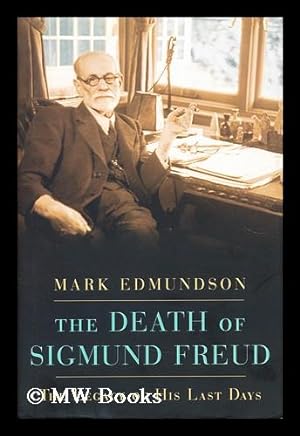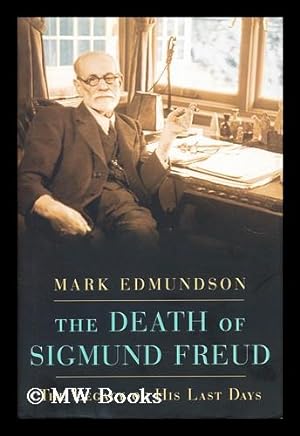edmundson mark 1952 (2 Ergebnisse)
Produktart
- Alle Produktarten
- Bücher (2)
- Magazine & Zeitschriften
- Comics
- Noten
- Kunst, Grafik & Poster
- Fotografien
- Karten
-
Manuskripte &
Papierantiquitäten
Zustand
- Alle
- Neu
- Antiquarisch/Gebraucht
Einband
- alle Einbände
- Hardcover
- Softcover
Weitere Eigenschaften
- Erstausgabe
- Signiert
- Schutzumschlag
- Angebotsfoto
- Kein Print-on-Demand
Gratisversand
Land des Verkäufers
Verkäuferbewertung
-
The death of Sigmund Freud : the legacy of his last days
Verlag: New York : Bloomsbury : Distributed to the trade by Holtzbrinck Publishers, 2007
Anbieter: MW Books, New York, NY, USA
Erstausgabe
First Edition. An exceptional copy; fine in an equally fine dw. Particularly and surprisingly well-preserved; tight, bright, clean and especially sharp-cornered. Literally as new.; 8vo 8" - 9" tall; 276 pages; Description: 276 p. ; 22 cm. Notes: Includes bibliographical references (p. 257-263) and index. Subjects: Freud, Sigmund (1856-1939) --Psychoanalysts --Austria --Biography. Summary: When Hitler invaded Vienna in March of 1938, Sigmund Freud, old and desperately ill, was among the city's 175,000 Jews dreading Nazi occupation. The Nazis hated Sigmund Freud with a particular vehemence: they detested his Â"soul-destroying glorification of the instinctual life. Â" Here Mark Edmundson traces Hitler and Freud's oddly converging lives, then zeroes in on Freud's last two years, during which, with the help of Marie Bonaparte, he was at last rescued from Vienna and brought safely to London. There he was honored as he never had been during his long, controversial life. At the same time he endured the last of more than thirty operations for cancer of the jaw. Confronting certain death, Freud, in typical fashion, did not let fame make him complacent, but instead wrote his most provocative book, Moses and Monotheism, in which he questioned the legacy of the greatest Jewish leader. Focusing on Freud's last two years, Edmundson is able to probe Freud's ideas about death, and also about the human proclivity to embrace fascism in politics and fundamentalism in religion. Edmundson suggests new and important ways to view Freud's legacy, at a time when these forces are once again shaping world events. 1 Kg.
-
The death of Sigmund Freud : the legacy of his last days
Verlag: New York : Bloomsbury : Distributed to the trade by Holtzbrinck Publishers, 2007
Anbieter: MW Books Ltd., Galway, Irland
Erstausgabe
First Edition. An exceptional copy; fine in an equally fine dw. Particularly and surprisingly well-preserved; tight, bright, clean and especially sharp-cornered. Literally as new.; 8vo 8" - 9" tall; 276 pages; Description: 276 p. ; 22 cm. Notes: Includes bibliographical references (p. 257-263) and index. Subjects: Freud, Sigmund (1856-1939) --Psychoanalysts --Austria --Biography. Summary: When Hitler invaded Vienna in March of 1938, Sigmund Freud, old and desperately ill, was among the city's 175,000 Jews dreading Nazi occupation. The Nazis hated Sigmund Freud with a particular vehemence: they detested his Â"soul-destroying glorification of the instinctual life. Â" Here Mark Edmundson traces Hitler and Freud's oddly converging lives, then zeroes in on Freud's last two years, during which, with the help of Marie Bonaparte, he was at last rescued from Vienna and brought safely to London. There he was honored as he never had been during his long, controversial life. At the same time he endured the last of more than thirty operations for cancer of the jaw. Confronting certain death, Freud, in typical fashion, did not let fame make him complacent, but instead wrote his most provocative book, Moses and Monotheism, in which he questioned the legacy of the greatest Jewish leader. Focusing on Freud's last two years, Edmundson is able to probe Freud's ideas about death, and also about the human proclivity to embrace fascism in politics and fundamentalism in religion. Edmundson suggests new and important ways to view Freud's legacy, at a time when these forces are once again shaping world events. 1 Kg.



